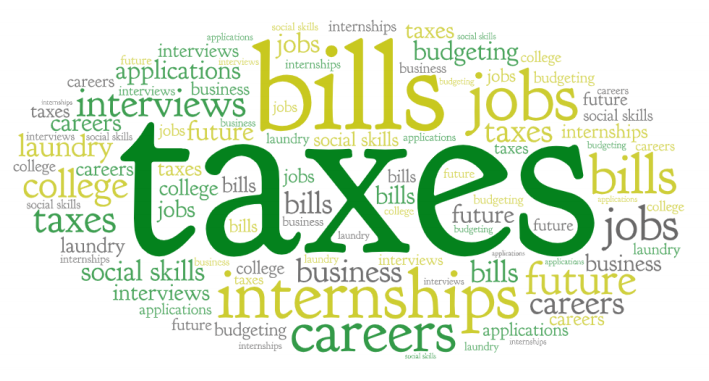Stepping Into the Future
As students start builiding up towards life beyond high school, does high school really do a good job of preparing students for the future?
Each school year marks a new chapter in our lives, yet goes by so quickly, that before we know it, we stand in line wearing our graduation caps and gowns ready to graduate. As we set our feet into the world, there are new challenges and problems that we are destined to face. Are we really prepared for those challenges? Does high school do a good job of preparing us for the future? Well, that’s the problem. We spend all four years of high school, searching through textbooks, and completing countless assignments for seven different subjects, yet we still don’t have a clear picture and understanding of what exactly we need to know for life beyond high school. Yes, we learn about how to solve for x, the explanation behind the Big Bang Theory, how Columbus colonized America, the meaning of work written by authors like Shakespeare, but is that all we need to know? Outside the rims of our textbooks, are the millions of valuable lessons and skills that are yet to be taught to students. With millions of lessons and skills out in the open and not one set in stone, it’s clear that high school does not do a good job of preparing students for the future.
All high schools follow a curriculum stating the topics required to be taught for every subject and grade level. Teachers cram in multiple lessons and end them quickly with a unit exam. Once the unit is done, everything from the previous unit is boxed up, put in storage and a new box is opened for the next unit. We follow the same process over and over again until the school year is over. Once summer comes, the important information is stored in our brains and everything else is likely to remain as a vague memory. The reason why we don’t remember everything we learn is because it’s less likely for us to use the things we learned in class on a day-to-day basis. What are the chances you walk into a store and calculate the percent of change between two items before picking the better buy? The chances are 0%.
I’m not saying what we learn in high school isn’t important. It’s actually sometimes beneficial and can be useful when we need it. For example, it’s good that high school English classes teach reading and writing strategies because in college, there are lots of reading and writing assignments that students should be prepared for. High schools like West High, do a really good job of preparing students academically, but other than that, students still remain uneasy on skills outside of academics.
I’m trying to emphasize that high schools focus too much on the curriculum, and hardly take the time to teach students other beneficial skills, such as how to write a resume or pay taxes. These types of skills are what students will need in the future as they move on to their adult lives. High school should do a better job of preparing students for skills like those.
From my personal experience, I know about the different skills and lessons that I need to know for the future, however, I don’t have those skills accomplished. I don’t know how to write a resume, how to pay for taxes, what I need to do for a job interview, etc. I don’t think that high school will teach me all of those skills. It’s likely that I will have to learn them on my own to better prepare myself. Many students at West High feel the same way. “I think that when it comes to picking out a career path and using skills from school to do the job some of us want, then yes, high school does help us, “ said Kamakshee Kuchal ‘24, “But when it comes to everyday tasks, such as filling out bills or how to cook an actual meal, we don’t know how to do it until we’re left out in the open on our own.” I can relate to this, and many other students said something along the same lines as well. According to a survey sent out to West High students with 38 respondents, it seems like all students are trapped in the same boat.
While some say they disagree and feel like high school does a good job of preparing students for the future, they still discuss certain things that we still need to know. “I think [high school] does [a good job of preparing us for the future] because we learn a lot of critical thinking skills and are required to take a variety of subjects that expand our scope and worldview. For the ICCSD in particular, I think the requirement of a personal finance class does an even better job of this,” says Kailey Gee ‘22.
However, she still agrees with the fact that there are many important skills that are not taught in school. “I think high schools should teach us more about tips on how to save money… I also think stuff like interview tips, how to make a good resume, customer service skills, etc. would be helpful because you need those for every job and interview [which] can be intimidating if you don’t feel prepared,” Gee said.
Students were asked how prepared they were for the future on a scale from one to five, one being the least prepared and five being the most prepared. The majority of students, 19 out of the 38, answered 4. Coming in a close second, 12 out of the 38 answered 3. According to the responses, most students feel like they were prepared for the future not because of high school, but because of themselves. They feel confident enough to be able to learn the skills needed in the future on their own or with the help of an adult, parent or guardian. They aren’t completely reliant on high school to teach them those necessary skills. “I think that I will be prepared but not because of high school. I’ll be prepared because I’m preparing myself for MY future…I want to figure things out on my own but I also wouldn’t mind help from trusted adults and teachers, ” said Precilia Kangni ‘24.
For other students, they are still not sure about how prepared they are. Many are afraid to approach adult responsibilities on their own and don’t feel like high school has taught them enough necessary skills. “Honestly, responsibility kind of scares me, and I never feel ready to be in charge of anything when I start,” said Vivian Polgreen ’23. Since a large number of students either feel prepared only because they have prepared themselves on their own or don’t feel prepared because they didn’t learn enough skills from high school, it’s obvious that high school doesn’t do a good job of preparing students for the future.
Indeed, one trimester classes like personal finance exist, however that is still not enough. Twelve to 13 weeks isn’t enough time to learn, practice, and elaborate life-long lessons and skills. Although it won’t be possible for high school to teach every single skill, the ones that students find the most challenging or important should be stressed the most.
In the end, the discussion about whether or not high school does a good job of preparing students for the future remains open-ended, but we can all come to the agreement that there are many things that high school should teach students. Upon many student answers, skills that involve taxes, bills, jobs, college, and social life were the ones that most students feel are important and wish were better taught. The list continues to grow each day as more adult responsibilities become introduced later on in high school years. We are all at different levels of preparation for the future, and that is 100% normal.
As we each get ready for the things that are headed our way, high school as a whole should do a better job of playing a role in helping us prepare for the future. This can be achieved through more classes that offer the teaching of certain life skills, a change in the curriculum that involves teaching things outside of academics, and a greater emphasis on areas that students don’t feel fully prepared for. It definitely matters if some students are ready to handle things on their own while others aren’t. We will all face the same things after all, and no one deserves to make their first step into the future feeling unprepared for everything.
Your donation will support the student journalists of West High School. Your contribution will allow us to purchase Scholarship Yearbooks, newsroom equipment and cover our annual website hosting costs.

(she/her) Wesal Haroun is a senior at West High and this is her third year on staff. She is the Trojan Epic Yearbook Co-Editor-in-Chief. In addition to...



